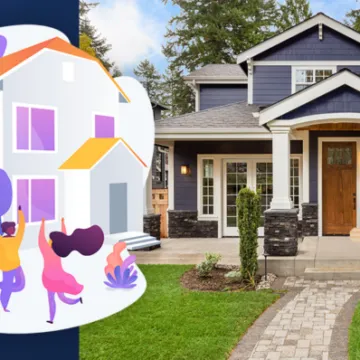It’s a sobering fact that many of us experience the unfortunate impact of natural disasters.
A recent survey showed that four-in-ten Americans say their local community has experienced severe weather like floods, storms, extreme temperatures, wildfires, and other disasters.
During weather threats, many families act to ensure their safety and wellbeing, recover treasured possessions and survive difficult living conditions.
As residents in vulnerable areas of the U.S. anticipate potentially dangerous weather, there is a risk that households will suffer financial challenges as a result of the weather and climate events.
If you are facing an unexpected natural event or the continued challenges of ongoing national emergencies, here are tips to manage the financial impact of natural disasters and mitigate the financial stress these events can cause.
- Document Financial Information: Keep important financial documents, account details, and contact information in one secure place. This will be useful in case of unexpected events where you need to access your financial information quickly. Manage your online access and secure passwords to financial information mobile apps to access your online accounts, transfer funds, pay bills, and even deposit checks remotely. Familiarize yourself with these apps before an emergency occurs. During an emergency, it’s important to have quick access to your financial information to help you make informed decisions and navigate the situation effectively.
- Use Cash and Emergency Funds: Prioritize your expenses to take care of immediate, essential needs – medicine, food/water, heat/electricity and housing. Use any regional or national relief, loyalty and credit card rewards to cover expenses.
- Contact disasterassistance.gov, local and state agencies as well as nonprofit organizations for assistance. Federal Emergency Management Agency (FEMA), American Red Cross, United Way, Salvation Army, Veteran Affairs and local food banks may provide needed services. The Disaster Supplemental Nutrition Assistance Program (D-SNAP) gives food assistance to low-income households with food loss or damage caused by a natural disaster.
- Keep Digital Copies: Scan or take photos of important financial documents, such as insurance policies, identification, bank account details, investment accounts, and any legal documents. Store these digital copies in a secure cloud storage service, encrypted USB drive, or an email account with strong security measures.
- Create a Physical Emergency Kit: In addition to digital copies, gather physical copies of important documents and keep them in a waterproof and fire-resistant container. Include items like your driver’s license, passport, birth certificates, wills, powers of attorney, and insurance policies.
- Be Extra Careful: Watch out for scams and fraud, which are an unfortunate part of disaster recovery. Regularly monitor your financial accounts and statements online. This can help you detect any unauthorized or unusual activity promptly and take appropriate actions.
- Contact Insurance: Assemble all insurance contact information for car, home. If you haven’t already, contact your insurance companies to file a claim as soon as you can. Whether it’s auto, home, fire or flood damage, your insurance company will help you take the necessary steps to make a claim. Use your smartphone to take photos and video of any damage and save the photos to a cloud-based account, so that you can make an inventory and prove damage. The sooner you file, the better – as insurers will face a significant number of claims.
- Know Your Options: Contact your landlord, credit card and mortgage companies, and other creditors to request hardship assistance. If the disaster, such as a catastrophic weather event, affects your ability to make debt or housing payments on time, your creditors may offer forbearance, payment deferral, payment plans or waived fees. GreenPath counselors can join the call with your loan servicers and help you sort out the terms.
- Contact Utilities: Call your utility companies immediately, if you cannot live in your home due to damage. Utilities can put a stop hold on billing if you are not living in the home or not receiving utility services. By connecting with utility companies, you can ask about available relief programs and hardship assistance.
- Stay Calm and Organized: During an emergency, emotions can run high. Take a deep breath, stay organized, and make decisions based on rational assessment of your situation and available options. Enlist a trusted family member or friend so you don’t have to face the challenge alone.
GreenPath Financial Service
GreenPath, A Financial Resource
If you’re interested in building healthy financial habits, paying down debt, or saving for what matters most, take a look at these free financial tools.
Remember every emergency situation is unique and might require additional steps. The goal of preparing your finances for an emergency is to create a sense of financial health and resilience. Start with these steps and tailor them to your specific situation to ensure you’re well-prepared for whatever unexpected events may come your way.










